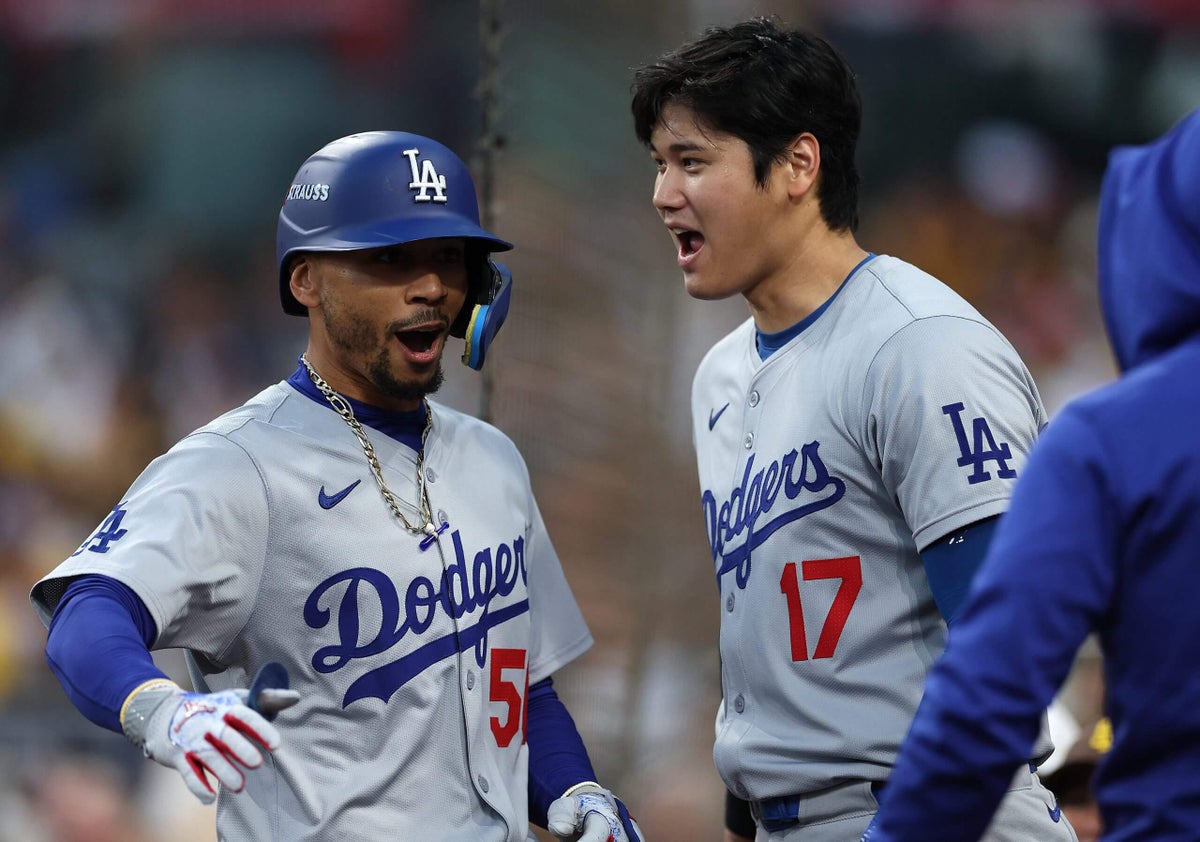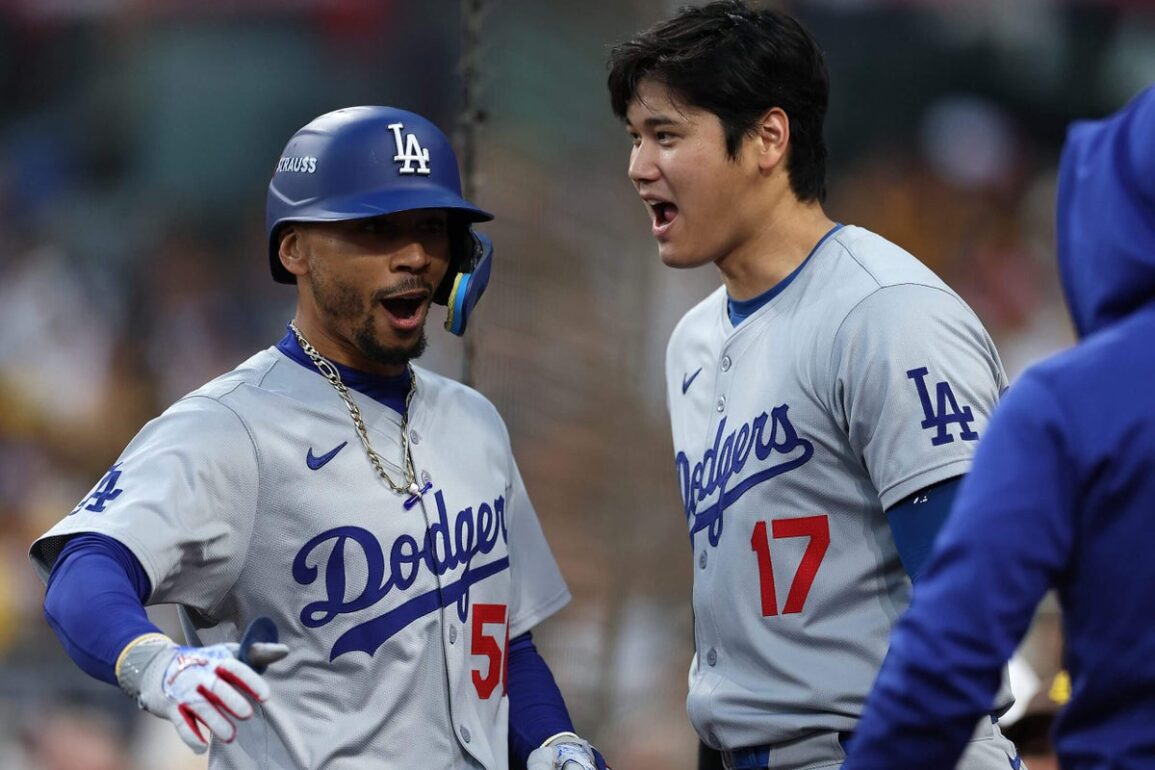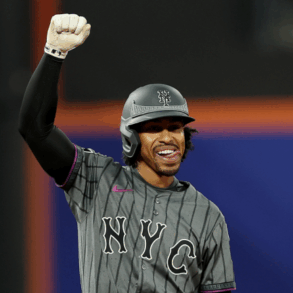
Deep in the heart of every baseball fan fuming about the spending of the Los Angeles Dodgers, there lies an uncomfortable truth: You’re just mad your owner isn’t doing the same thing.
Sure, under Major League Baseball’s current economic system, the game’s financial playing field is tilted. But if you’re a fan losing your mind over the Dodgers’ latest big-money flex, know this: The playing field is not entirely to blame, if indeed it should be blamed at all.
Advertisement
Yes, the Dodgers are exploiting the system through a formula of signing bonuses and deferred payments, using money generated from a 25-year, $8.35 billion local-television deal and their league-leading attendance every year since 2013. No other team operates from such a financial foundation. Perhaps no other team would be as comfortable effectively shelling out more than $35 million per season for left-handed reliever Tanner Scott, including salary and a 110 percent luxury-tax penalty. The tax will be in effect for at least the first two years of Scott’s four-year deal.
The Dodgers, though, also are schooling opponents with a relentless mindset not enough rival ownerships share. Are they ruining baseball? From a financial perspective, at least, it’s the opposite. As rich as the Dodgers are, they’re improving the bottom lines of other teams, too.
The Dodgers’ road attendance last season, following the addition of Shohei Ohtani during their $1 billion offseason, was the highest in the majors since 2008, according to STATS Perform. They were the largest contributor to revenue sharing, and half of their record $103 million luxury-tax penalty also was redirected to other clubs.
Villains are valued in many forms of entertainment, from films to the WWE. The Dodgers are the latest Evil Empire in baseball, drawing fresh attention to the sport. They’re acting this winter as if the San Diego Padres knocked them out of the playoffs instead of the other way around. They’re willing to don black hats in place of classic Dodger blue. But all teams should compete with the same zeal.
Complacency in baseball spans all market sizes. Small-market teams such as the Pittsburgh Pirates and Miami Marlins are not the only ones refusing to compete to the best of their capabilities. So are mid-market teams such as the Seattle Mariners and Minnesota Twins. And large-market teams such as the Boston Red Sox and Chicago Cubs. Just to name a few.
Advertisement
Yet for all that, the sport is not out of whack competitively; its last repeat champion was the New York Yankees, who won three straight World Series from 1998 to 2000. The expansion of the postseason to 12 teams in 2022 only enhanced the potential for randomness in October. The Dodgers were upset by less extravagantly funded division rivals in both 2022 and ‘23, and the Padres needed only one win at home, with the Dodgers throwing a bullpen game, to make it three straight early eliminations in ‘24.
Owners and some fans crave a salary cap and accompanying floor, believing it would prove a competitive panacea. But super teams exist in cap sports. The NFL’s Kansas City Chiefs are going to their seventh straight AFC Championship Game. The New England Patriots appeared in eight straight. In the NBA, elite players frequently maneuver to join forces. A cap might produce greater financial fairness. But shrewd, skillful front offices like the Dodgers’ still would prevail.
The Dodgers’ unprecedented spending will only accelerate renewed talk of a cap, even as Ohtani and Co. elevate the game the way Michael Jordan and Co. once did in the NBA with the Chicago Bulls. As the television landscape shifts, Manfred wants to create national packages for major streaming companies to bid on in 2028. The Dodgers and other large-market clubs, holding the most valuable rights, likely will oppose the idea. Manfred could attempt to alleviate those concerns by tying the national TV package to a cap, but then the players will stand in the way.
A push by the league for a cap definitely almost certainly would lead to a work stoppage, one that might cost the sport part or all of the 2027 season. Hardly the wisest strategy at a time when the game, following the introduction of the pitch clock, is coming off back-to-back increases in attendance for the first time since 2011-12.
Better the sport enhance the current system to give revenue-sharing recipients additional draft picks and other benefits, while enforcing more stringent spending requirements on those clubs (an adjustment in the calculation of luxury-tax payrolls also might be necessary to make deferrals less of an advantage). And better some current owners sell to more ambitious cohorts, people like the New York Mets’ Steve Cohen, Philadelphia Phillies’ John Middleton and San Diego Padres’ late Peter Seidler.
Advertisement
The Athletic’s Aaron Gleeman pointed out on X that, per Fangraphs, the Dodgers’ payroll is $370 million while the entire AL Central is at $544 million combined, spread across five teams. Well, let’s look at how those five AL Central clubs are operating. The Kansas City Royals, playing in the smallest market, are the only ones acting as if they are hellbent on winning.
The Cleveland Guardians reached the American League Championship Series last season. Since then, they’ve traded their first baseman and second baseman, and likely will end up with a payroll similar to last season’s. The Minnesota Twins in 2023 won their first postseason series in 21 years, then went into payroll retreat. The Detroit Tigers followed their incredible run to a wild card last season by making only two modest additions, right-hander Alex Cobb and and second baseman Gleyber Torres. The Chicago White Sox, rebuilding while playing in the division’s largest market, are coming off a 121-loss campaign.
The NL Central isn’t much better. The Chicago Cubs possess the resources to bully the division, but their current estimated payroll is $48 million below where it was last season. Owner Tom Ricketts, speaking to 670 The Score at the Cubs Convention, sounded almost offended by the mere discussion of payrolls.
“I don’t think fans should spend all their time thinking about which team has more money or how much they’re spending. It just becomes a big narrative that’s a distraction,” Ricketts said. “I think our fans somehow think we have all these dollars that the Dodgers have or the Mets have or the Yankees have, and we just keep it. It’s not true. We just try to break even every year.” Ricketts said.
Ricketts bought the Cubs in 2009 for $845 million. Forbes now estimates the franchise is worth $4.225 billion. If Ricketts doesn’t want fans thinking about money, perhaps he should lower his ticket prices so they are not among the most expensive in baseball. And if he wants to support his claim that he is just trying to break even every year, he is more than welcome to open his books. Only two clubs provide such information, the Atlanta Braves and Toronto Blue Jays, and only because they are part of publicly traded companies.
People forget – the Dodgers, under previous owner Frank McCourt, were not nearly the behemoth they became under Guggenheim Baseball Management, which purchased the club for $2 billion on May 1, 2012. Controlling owner Mark Walter, chief executive officer of the financial services firm Guggenheim Partners, oversaw this latest renaissance. The $8.35 billion broadcast agreement. The hiring of Andrew Friedman as president of baseball operations. The ongoing improvements to Dodger Stadium. The additions of one superstar after another.
No question, the Dodgers operate with massive inherent advantages. But they work them to maximum effect, using signing bonuses and deferrals to help alleviate tax burdens for players who are not California residents. Players want to be in Los Angeles; Scott and Roki Sasaki agreed to their deals even with the wildfires raging. Players also want to join a club with a track record of excellence. The Dodgers have made 12 straight playoff appearances and won two of the past five World Series.
Advertisement
The beauty of baseball is that it offers no guarantees. Winning the offseason does not necessarily mean winning the World Series. The Dodgers might end up placing 12 starting pitchers on the injured list, the way they did last season, or fall victim to other forms of bad luck. But rest assured, they will adjust if necessary.
The financial playing field in baseball is not level and perhaps never will be, reflecting a sport in which teams rely more on local than national revenue. The increasing disparity between the game’s haves and have-nots is a legitimate concern. But calls for greater competitive balance have existed since the days of Babe Ruth. They would carry more legitimacy today if more teams were trying.
(Top photo of Mookie Betts and Shohei Ohtani: Harry How/Getty Images)
This post was originally published on this site be sure to check out more of their content.







